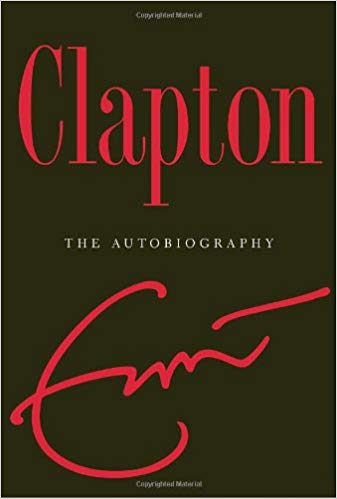There’s a micro-genre of books that I’ve come to love: rock-star autobiographies.
Many of the musicians I followed when I was younger have probably finished up the most interesting and/or lucrative portions of their music careers, and have turned to the written word as a different outlet.
Having told stories through their songs over the years, they have the chance, through the autobiography/memoir, to express themselves in a different medium. Of course, as with the music, some are better at it than others. For those not so gifted with the ability to write extended prose, there are undoubtedly ghost writers (credited or uncredited) to help them along.
So here’s a list of some of the books I’ve read over the last few years, followed by another list of the ones I want to read:

Clapton: The Autobiography, by Eric Clapton. I just recently finished this one, and I loved it. Ok, maybe the title wasn’t too imaginative, but that’s OK. Like all good autobiographers, he dispenses with his childhood in as few pages as possible (although his childhood was definitely interesting—his mother was young and unmarried when he was born, and he was raised by his grandparents, led to believe that his mother was his sister), and gets to the music pretty quickly. In Clapton’s case, the music was the blues. He began obsessively studying the great American blues musicians, and when he finally got a guitar of his own, he worked painstakingly to learn everything about their technique that he could, eventually developing his own style. His development as a musician with the Bluesbreakers, Cream, Blind Faith, Derek and the Dominos and finally as a solo artist is described in fascinating detail.
A couple of years ago I read Wonderful Tonight by Pattie Boyd. She had the distinction of having been married to George Harrison and then Clapton, and some of rock and roll’s greatest songs were written about her: Something, by Harrison; and Layla, by Clapton (as well as Wonderful Tonight, which, eh, I don’t count as among the greatest songs). In reading Clapton’s book, you realize that she inspired a lot more than those two songs in his catalog; she was an obsession of his for years, and I’d say that just about every song on the Derek and the Dominos album that he wrote seems to be about her, plus some later on.
Along with the music, the other main story told in Clapton’s book is of his addiction, first to heroin and then to alcohol. He managed to escape, however, and by the time he wrote the book in 2008, he was 20 years sober and had established a recovery center in Antigua called the Crossroads Center.
My only complaint with the book is near the end—the last 30-40 pages are a recitation of people he’d known over the years that ended up dying, mixed in with Clapton finding ways to spend his considerable sums of cash, such as buying a 150-foot yacht to cruise around the Mediterranean. Talk about conspicuous consumption. All in all, though, it was a good read.

Life, by Keith Richards. This was one fun read. You can learn a lot from reading this book, from how to tune a guitar to how to survive a knife-fight, to how to inject heroin. Oh, and if I remember correctly, there are a few recipes along the way.
Of all of the books on this list, I would probably have to say that this one was my favorite. He lays out his story and the history of the Rolling Stones very well, but mostly it’s just a very entertaining read about, well, life. And speaking of which, it’s a miracle that Richards has been blessed with so much of it—life, that is—considering everything his body has been through over the years, but that’s part of what makes the book so enjoyable.
With all of the books on this list of course, if you don’t like the author’s music, you probably won’t be interested in the book. But with this one, even if you’ve never been a Rolling Stones fan, you’ll find something to like.

Simple Dreams, by Linda Ronstadt. She was my first love, musically. This book is a recitation of Ronstadt’s evolution in music, from country to rock to pop to Spanish-language ballads. I was a big fan for a long time, so I enjoyed reading her version of her life, particularly the years when she was just starting to make it in Los Angeles, and singing with a lot of people who went on to stardom out of that scene, like the Eagles, James Taylor, J.D. Souther, etc. She basically got the Eagles together.
My one complaint about the book is that, as she goes through her years in the business, she essentially skips over what is my favorite part of her career, the years in which she put out the albums Prisoner in Disguise and Hasten Down The Wind. I think a lot of people would agree that those are her two best records, and I would have loved to read about what went into putting them together, but they are barely mentioned in the book.

The Truth Is …: My Life in Love and Music, by Melissa Etheridge. One of the reasons I read a book like this is to try to understand what artists are thinking about when they write songs. Often, I’m disappointed in that quest; they’ll write about a couple of songs, but for the most part they deliberately leave the song origins and meanings opaque. The listener has to figure out what a given song means, or develop his or her own interpretation of it. Etheridge, however, goes into great detail about a number of songs, what inspired them and how they were written. She’s a very emotional songwriter—and performer—and she really lets the reader in on where the songs came from.

This Wheel’s On Fire, by Levon Helm. Helm was the beloved drummer for The Band, and one of its original members. The book, which he wrote in 1993, details his musical upbringing and the history of The Band, serving as a backup to Ronnie Hawkins and later Bob Dylan, before breaking out on its own.
The story of The Band is also the story of the relationship between Helm and guitarist Robbie Robertson. By the mid-1970s, the relationship was fraying, and the group decided to split up, putting on one last concert, which was filmed for the movie The Last Waltz, arguably the best concert movie ever. That final concert is a big part of the book—and Helm answers one of rock and roll’s biggest questions: how the heck did Neil Diamond get to be a part of that movie?

Who I Am: A Memoir, by Pete Townshend. This was my most-anticipated book on this list. I was a huge Who fan back in the day, and in particular a Pete Townshend fan. In addition to creating some of the greatest rock songs ever recorded, he’s also written a lot of prose about rock and The Who’s place in rock history. So I figured his autobiography would be fascinating.
And it was, for a while. It was great to get some inside information about the roots of The Who and the creation of albums like Tommy, Who’s Next and Quadrophenia. Unfortunately, Who’s Next—in my opinion the No. 1 rock album of all time—got short shrift in the book; at least I felt that way. And for me, the book devolved into way too much description of the various recording setups he used. Great info if you’re into sound engineering, but I just like the songs, not the specs of the mixing board. Also, Townshend, who has always been one for confessionals, spends a lot of ink on the various affairs he had while he was on the road touring with the band or even back at home, and his regrets for the resulting pain it caused for those around him. I get it; he’s a rock star. And there’s a certain lifestyle that goes with that. But honestly, I don’t want to read about that stuff. So while I enjoyed reading the book, ultimately it wasn’t one of my favorites.
Future Books
There are few more books in this genre that I want to read. First, the ones I know about:
• George Harrison, I Me Mine—This one has gotten mixed reviews, but I want to read what he has to say about Pattie Boyd and Eric Clapton (see above)
• Robbie Robertson, Testimony—And this one will be good to get his side of the breakup of The Band, and see how it compares with Levon Helm’s.
• Broken Music, by Sting—Although this seems to be about his life up until The Police; still, it should be interesting. There’s also One Train Later, by Andy Summers, guitarist for The Police; that might be more what I’m looking for.
• Unfaithful Music and Disappearing Ink, by Elvis Costello. I’ll put a big MAYBE on this one. Elvis tends to be very coy in his writings and interviews, and my desire to read this book sort of depends on whether it’s written for his entertainment or for the reader’s. Also, it’s 672 pages, so … maybe sometime when I’m confined to a hospital bed…
And here are a few artists who, as far as I know, haven’t yet written memoirs, but I’ll look forward to them if they ever do: Dave Matthews, David Gray, Amos Lee, Mark Knopfler, Mick Jones (The Clash, not Foreigner), Natalie Merchant, Sarah McLachlan and Bono.
Comments?
So, am I missing anybody? Are there other rock-star autobiographies that you’ve read and liked (or disliked)? Who else should I add to my list? Let me know in the comments below, and, as always, thanks for reading.


February 10, 2019
You left out how Levon’s book is scathingly angry and bitter. Man does he hate the Last Waltz and Scorcese! But it is a great read. Your right about the Townshend book – he may be God but he’s also a total fucking mess. But at least he knows it. KEEFS is the best. It just oozes his personality and his love of Mick is endless but he sure has had it with Brenda. The Daltrey and Springsteen books are both really good. When I read Woody’s autobiography I really noticed that all the English rockers grew up exactly the same, playing in craters left over from the War and subsisting on post war rations, which is probably why so many are so short. I couldnt finish either the Wyman or Costello books. Wyman just got tedious and Elvis was just too Elvis. I really hope Michael Philip Jagger writes one.
February 10, 2019
Oh. A must read is Clarence Clemons book!!! It’s beyond explaining. It’s just great.